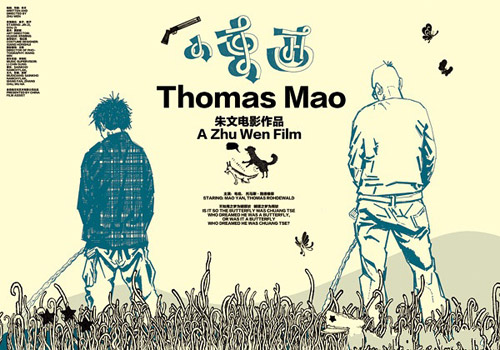RIT Hosts Films and Symposium about the New Wave of Chinese Cinema
Free screenings throughout Rochester starting Sept. 21; symposium Oct. 8 and 9 at RIT
Acclaimed Beijing filmmaker and author Zhu Wen will screen several of his films, including Thomas Mao, and participate in a symposium about Chinese cinema Oct. 8 and 9.
Independent filmmakers from mainland China, whose films have won at Cannes, Berlin and Tribeca Film Festivals, premiere their work in Rochester starting Sept. 21.
With the support of the New York Council for the Humanities, Rochester Institute of Technology will be hosting a series of film screenings culminating with a two-day symposium featuring writers and scholars of Chinese cinema. Among the guests will be acclaimed filmmaker and author Zhu Wen who has been intimately involved in the tight Beijing filmmaking community that has given rise to many of the most famous “Sixth Generation” films. The Oct. 8 and 9 symposium will look at issues surrounding new Chinese cinema. All events are free and open to the public. To learn more, visit the Sixth Generation: Symposium on the New Wave website.
“In the United States, there are only a handful of writers and even less filmmakers that have any real knowledge of these wonderful films, mainly because they are screened only at festivals and aren’t all distributed” says Geoffrey Alan Rhodes, professor in RIT’s School of Film and Animation. “Yet these filmmakers are some of the freshest voices in contemporary media—filmmakers making films for arts’ sake—censored, almost completely underground and without any legal public venue for national distribution.”
The following are the film screenings:
Beijing Bicycle (2001), Wang Xiaoshuai: 7:30 p.m. Sept. 21, The Cinema Theater, 957 S. Clinton Ave. A story not unlike the Italian Neorealist classic by Vittore de Sica, The Bicycle Thief, like its namesake, Beijing Bicycle, is an excellent record of youth, class struggles, poverty, rural migration and other challenges Beijing faces.
This film will be introduced by Greta Niu, professor, University of Rochester’s English department.
Quitting (2001), Yang Zhang: 7:30 p.m. Sept. 28, The Cinema Theater, 957 S. Clinton Ave. The film’s protagonist, Jia Hongshen, was the leading actor of many early low-budget “Sixth Generation” films. This autobiographic effort exposes the life of a subculture figure living through the 1990s, showing a daring touch on drug use, homosexuality and psychotic behavior.
Summer Palace (2007), Lou Ye: 7:30 p.m. Oct. 4, The Cinema Theater, 957 S. Clinton Ave. This highly controversial film was hampered in production for many years and was banned in mainland China after its release. The film takes place in 1989 and passes through the two major events of the year—Tiananmen Square and the falling of the Berlin Wall. Ye is perhaps the most outspokenly dissident filmmaker among the group and this film portrays the symbolic collision within contemporary China.
Lost in Beijing (2008), Li Yu: 7:30 p.m. Oct. 7, Visual Studies Workshop, 31 Prince St. Yu is one of the few female Chinese directors in the Sixth Generation group. Lost in Beijing is a dark comedy focusing on working class Beijing life that may be the most current portrait of China just before the Olympic Games. The film was widely released in China and was a rare case of a commercial film gaining critical praise. This film will be introduced by Shu Chin-Tsui, professor of Asian Studies, Bowdoin College.
The films of Zhu Wen part I, 3 p.m. Oct. 8, Room A205, Liberal Arts Hall on the RIT campus.
The films of Zhu Wen part II, 1 p.m. Oct. 9, Room A205, Liberal Arts Hall on the RIT campus.
The symposium has invited acclaimed Beijing filmmaker and author Zhu Wen. Wen is the director of the new film Thomas Mao (2010). Thomas Mao provides a fresh take on the style and content of new Chinese cinema. Wen will screen selected films.
The following are the symposium roundtable discussions:
Generation in Transition: Reality and Realism in Sixth Generation™ Films, 11 a.m. to 1 p.m. Oct. 8, Louise M. Slaughter Hall, rooms 2230 and 2240, RIT campus.
The new wave of films from mainland China have been important examples of the resurgence of realist cinema. Chinese art house film has been characterized by approaching major social issues with attention to marginalized characters and themes subtly presented. It can be argued that this is a result of China’s unique culture of censorship, media exposure, or a quickly changing economy and national identity. This roundtable will seek to dissect these and other interpretations of the realist style, and how it functions for filmmakers and audience, domestically and internationally.
Chaired by Yingjin Zhang, director of the Chinese Studies program, University of California, San Diego
Cinema verite, Neo-Realism and the New Wave: Breaks and Turns in Contemporary Chinese Cinema, 10 a.m.-noon Oct. 9, Louise M. Slaughter Hall, rooms 2230 and 2240, RIT campus.
Similar to the Friday panel, this roundtable will take as its subject the particular style of much of the Sixth Generation films, but here seek to put it in film history context, from post war realist film in Italy and France to global contemporary styles in cinema. Chaired by Zhen Zhang, associate professor, Tisch School of the Arts at New York University.
Future generations, what’s next for Chinese cinema? 3-5 p.m. Oct. 9, Louise M. Slaughter Hall, rooms 2230 and 2240, RIT campus.
As the title pronounces, this roundtable will take on the ambitious topic of what the future holds for Chinese cinema. As is the nature of these discussions, it will be one part brainstorm and one part analysis of the immediate trends, politics, and changing attitudes of Chinese culture, art, and cinema. Chaired by Kevin Lee, vice president of programming and education, Generate Films.
Adds Rhodes: “I believe that by inviting some of the most acclaimed writers and critics in the country to Rochester to discuss the films it will help open the eyes of our local students, filmmakers and film buffs.”













